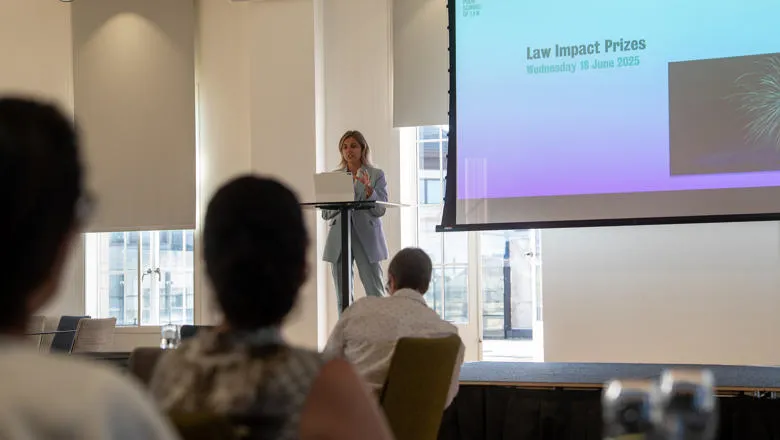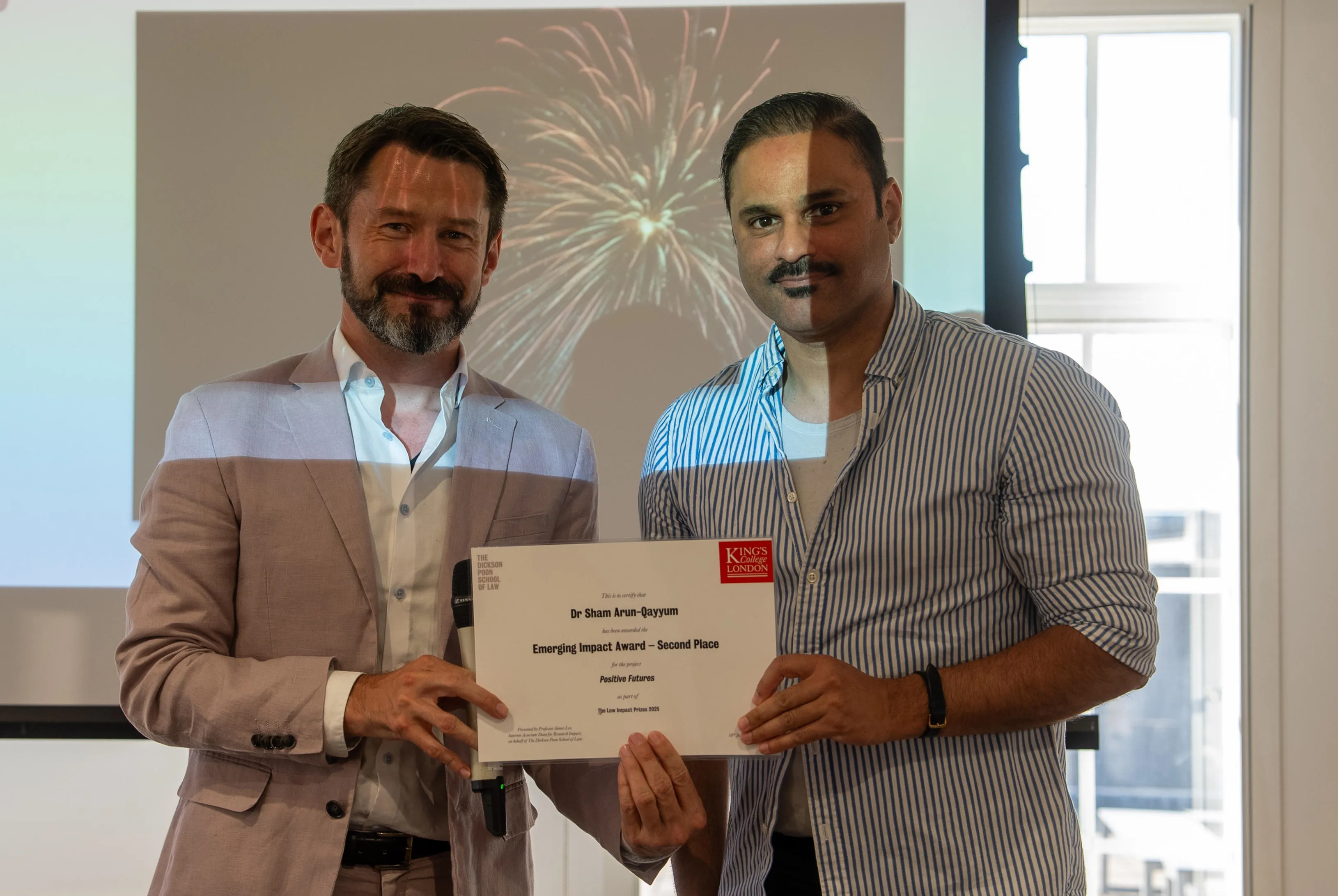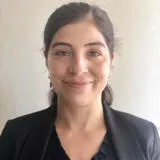This award means everything. I strive to add to the stock of knowledge in the world and ensure that knowledge improves people’s lives. The next step is to have the new R&D model in my work embraced worldwide, and this award helps with that process.
Dr Johnathon Liddicoat
07 July 2025
The Dickson Poon School of Law awards second cohort of Impact Prize winners
On Wednesday 18 June, The Dickson Poon School of Law hosted its second Impact Prize ceremony, recognising research and impact activities from academics and PhD students.

Following the success of the inaugural event in 2023, the event was an opportunity to celebrate academics, researchers and PhD students across the faculty whose research is making real-world change.
This year, the two categories were:
- Impact with Evidence – research projects with mature impact that can be easily evidenced
- Emerging Impact – research projects that are starting to have an impact, but are less established, or for those who are currently undertaking impact and knowledge exchange activities with the expectation of driving change
Impact with Evidence
Winner: Dr Johnathon Liddicoat - ‘A new model of drug research and development’.
Dr Liddicoat’s research shows that hospitals and universities conduct many trials for developing new uses for existing drugs, a process known as repurposing. Indeed, the data from his research shows that hospitals and universities conduct more phase II and III repurposing trials than companies across drugs’ lifetimes – findings that contradict established pharmaceutical innovation theory.
This research has confirmed and expanded experimentation done since 2015 by policymakers in the EU, US and UK to authorise treatments developed by universities and hospitals, describing a new theory to explain the research and articulating sustainable, creative strategies to pursue authorisations. Together, the new theory and strategies form a new model of drug research and development.
Dr Liddicoat has provided advice to government programme leaders, non-profit organisations, the NHS and scientists, as well as advising senior members of the US Food and Drug Administration on new legislation that permits them to authorise new treatments.
Winner: Professor Alison Jones - Combatting corruption and collusion in public procurement
In 2024, Professor Jones published a book on the topic of combatting collusion and corruption in public procurement. The book focuses on the question of how to ensure that the purchasing of vital goods, services, works, and infrastructure by governments is not undermined by corruption or collusion.
Since working on this matter, Professor Jones has presented the research at several seminars and lectures and shared, or discussed, it with experts working in international institutions and competition agencies. Following the award of an ERSC IAA New Government Grant, Professor Jones’ impact work will continue. Her project will bring together a group of experts to discuss mechanisms that might enable the UK Government, public procurement officials, and competition and anti-corruption agencies, to develop a more proactive, integrated, and coordinated approach to fighting corruption and collusion in public procurement in the UK. It is hoped that the creation of a more resilient, and procompetitive, public procurement system will help the Government to decrease government spending; to provide UK citizens with more and better public goods and services; and, consequently, to increase economic growth, human development and national security, to reduce poverty, and to foster trust and confidence in the Government and its institutions.
It is wonderful to receive recognition of the importance of this research topic. In many countries spending on public procurement accounts for nearly 30 per cent of all government expenditure. This expenditure relates to goods, services, works, and public infrastructure that are of immense and everyday importance to citizens. Yet few jurisdictions have proved to be very successful in protecting public procurement processes from corruption or collusion, which thwart government objectives and lead to the depletion of state resources and reduce the quantity, and quality, of these essential public goods and services. This project focuses on how governments, public procurement agencies and law enforcement institutions can work better together to protect the integrity of their public procurement systems and thereby improve citizens’ lives.
Professor Alison Jones
Emerging Impact
Winner: Francisca Soto Monteverde (PhD student) - The Lithium Triangle: a socio-legal analysis of its normative governance
Francisca’s PhD research investigates how laws and regulations in Chile and Argentina govern lithium extraction and how this normative framework distributes benefits and socio-environmental harms among the different actors of the mineral value chain.
This research aims to inform and influence stakeholders across Latin America, Europe, North America, and Australia, where lithium is considered a critical mineral. It offers the first legal-empirical analysis of lithium extraction governance in Latin America through a distributive justice lens, addressing a major gap in legal energy transition scholarship.
The findings are expected to shape professional standards, guide legal and industry practitioners, support evidence-based policymaking, and inform advocacy. The project may also enhance highlight ineffective governance mechanisms.
I’m honored and sincerely grateful to receive the Emerging Impact Award. This recognition is incredibly encouraging. The support will directly contribute to my upcoming fieldwork with stakeholders of the lithium industry, helping advance the policy impact of my research. Thank you to the DPSoL Impact Team for this opportunity.
Francisca Soto Monteverde
Second place: Dr Sham Qayyum - Positive Futures
Dr Qayyum utilised £25,000 of ESRC funding to deliver research and a range of activities to reduce regional inequality, with a particular focus on the London Borough of Brent.
The work focused on tackling the problem of SEND exclusion (proven to have poor outcomes for pupils) by supporting two groups of beneficiaries.
Nine workshops were developed in collaboration with local charities, to help parents obtain support for their child and challenge school exclusions (whether fixed, permanent, informal or so-called “managed moves”). Blogs, toolkits, and videos co-produced with UG Law students and made available on partner charity websites mean many hundreds of parents and care givers will benefit. Work with not-for-profits with a significant concern around SEND in Brent focused on how to effectively monitor, capture, and present outcomes data.
Quantitative and qualitative data from workshops with care givers shows increased knowledge of rights and confidence to assert their rights. Instances of families progressing to seek SEND diagnoses, or EHCPs, and challenging exclusion have also been recorded. Notably, a parent who challenged the decision to permanently exclude their 17-year-old, saw the Independent Review Panel recommending reconsideration by the school. Describing the impact of Dr Qayyum’s work as “significant” or “pivotal” to their success, three charities secured valuable funding. Accruing to over £225,000, the funding will facilitate the delivery of more workshops and research, peer-to-peer support for SEND families, advocacy, and campaigns.
This award is for the whole team that has worked collaboratively to make a real difference to the lives of a section of our community who often feel stuck and unsupported. It also demonstrates the powerful practical impact that we as academics can have on society outside our normal practice.
Dr Sham Qayyum
Third place: Mansha Mohee (PhD student) - Towards Accountability for Protracted Displacement in Africa: Prospects and Challenges of a Refugee-Centered Approach within International Law
Mansha’s research examines the rise of quasi-permanent configurations of forced displacement in the Global South and the limitations of current state and euro-centric approaches to accountability in international law. Using a refugee-centred perspective and a socio-legal methodology, it explores how international legal frameworks and externalisation practices shape displacement and (im)mobility in postcolonial states with the aim of informing more just and responsive policy responses.
Mansha’s work has already provided opportunities to meet a range of stakeholders, including policymakers, practitioners and civil society actors working on forced migration and justice in the Global South. These activities are actively informing the next phase of the project, including fieldwork, stakeholder dialogue and targeted policy briefs.
The intended impact of this work is to reframe international and regional discussions on refugee protection by centring the perspectives and experiences of the Global South, especially African states and displaced individuals in Africa. In the long term, the project aims to rebalance the accountability discourse and challenge prevailing hierarchies in international refugee law.
It means a lot to have the aims and potential of my research recognised at this stage. The spatialised and exilic dimensions of forced displacement are central to the contemporary politics of asylum. In this context, the urgent task is not only to reimagine protection mechanisms but also to rethink accountability for the conditions that sustain protracted displacement. By foregrounding the African refugee and African state as subjects of international law, my research aims to advance justice for forcibly displaced persons in the African and the Global South context more broadly.
Mansha Mohee






